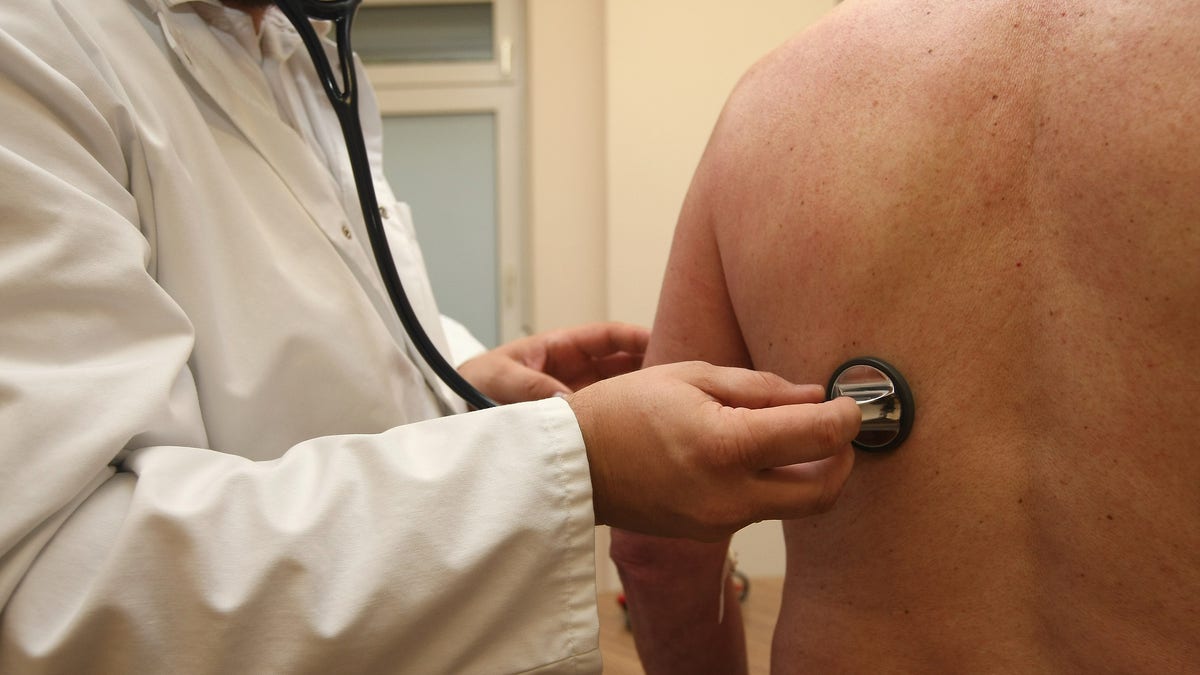
BERLIN, GERMANY - SEPTEMBER 05: A doctor uses a stethoscope on a patient on September 5, 2012 in Berlin, Germany. Doctors in the country are demanding higher payments from health insurance companies (Krankenkassen). Over 20 doctors' associations are expected to hold a vote this week over possible strikes and temporary closings of their practices if assurances that a requested additional annual increase of 3.5 billion euros (4,390,475,550 USD) in payments are not provided. The Kassenaerztlichen Bundesvereinigung (KBV), the National Association of Statutory Health Insurance Physicians, unexpectedly broke off talks with the health insurance companies on Monday. (Photo by Adam Berry/Getty Images) (2012 Getty Images)
Over the past few weeks, tens of millions of Americans tuned in to the political conventions. And not surprisingly, Obamacare was a central issue during both conventions. One party chanting for its repeal, the other touting its successes.
During his address, Donald Trump chalked up the need to repeal and replace Obamacare to the fact that you will be able to “choose your own doctor again.” This was in stark contrast to Hillary Clinton’s mention of Obamacare which she says has insured 20 million people since its adoption.
So, why does the GOP have such a doom and gloom view of Obamacare? And why have they spent the past six years challenging the most comprehensive and inclusive health legislation ever passed by Congress? For starters, they might not want you to know that it’s working – particularly for the Latino community. And, that you actually CAN choose your own doctor, among other benefits.
In the six years since the Affordable Care Act (ACA) passed, we have made great strides to address health disparities in the Latino community. Before health care reform, 32 percent of Latinos were uninsured – the highest uninsurance rate of any racial or ethnic group in the United States. That lack of insurance was particularly troubling as Latinos tend to suffer from many illnesses and chronic health conditions at much higher rates than white Americans.
Since its enactment, the ACA has resulted in more than 4 million Latino adults gaining insurance coverage. Nearly 9 million Latinos with private insurance can now access free preventative healthcare, including flu shots, mammograms, depression and cervical cancer screenings. They can no longer be dropped by their insurer just because they get sick. Major federal investments and ongoing reforms to our health care system will soon improve the quality of care and management of chronic diseases. So it’s clear that Latinos stand to lose the most during a Donald Trump presidency.
- Princess for a day, hero for a lifetime
- People suffer, die in months-long waiting list for surgery in Venezuela hospitals
- Opinion: Obscure group helps block patient access to crucial medications
- Top insurer UnitedHealthcare warns it may leave Obamacare exchanges
- Buried in Obamacare paperwork, a lot of cancer patients have subsidies snapped
- Opinion: Obamacare’s opaque bureaucratic processes are a threat to innovation
Regardless of the progress we have made in increasing health equity, Obamacare has faced (and survived) two Supreme Court challenges and more than 60 repeal votes. Just a few months ago, Congressional Republicans came closer to repeal than ever before by using a fast-track legislative tool that sent a repeal bill to President Obama’s desk with only a simple majority in the Senate (it was of course vetoed).
While Obamacare seems invincible, it’s important that voters and supporters of the law not become complacent. Make no mistake, this election marks a critical juncture for Obamacare and our country. One that presents both opportunities and challenges for health reform, and will determine whether we want a more equitable, accessible, and patient-centered health system, or whether we reverse course toward a system of increasing health disparities.
Still, there is much more work to be done to ensure that the Latino community receives the high quality and equitable health care they deserve. While blacks and whites have seen their uninsured rates decrease by 50 percent as a result of Obamacare, Latinos have only seen theirs fall by 25 percent. According to the Urban Institute, 1 in 5 Latino adults are still uninsured and most are unaware of financial assistance available through the ACA. This means we have more to do to make sure Latinos fully realize all of the benefits accruing from the ACA. Health providers, promotoras de salud, navigators and other community leaders must do a better job connecting with Latino communities to educate them about the health insurance marketplace and the many low cost coverage options available.
So, where should the Latino community go from here? First, go to healthcare.gov to explore options if you haven’t already. Open enrollment for getting into the ACA health insurance exchange is fast approaching and you might not want to miss out.
From there, go to the polls this November. It’s not only important that you cast your vote to ensure the right presidential candidate makes it to the White House, but that you are making your voice heard when it comes to electing local and state legislators. They are often the ones making decisions on state healthcare matters, so make them aware of the issues and how you want them to act on your behalf.
Because not voting could mean waking up on November 9 to find a “wall” built between you and the healthcare coverage that is your right and privilege.








































